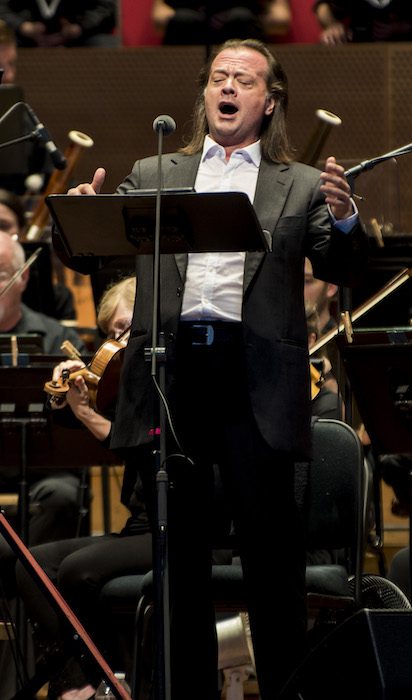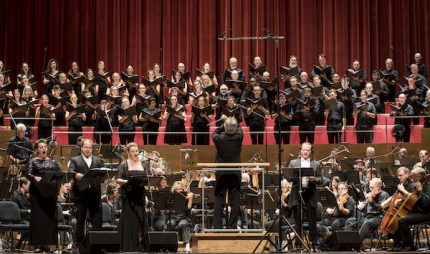Kalmar, Grant Park colleagues provide a summer high point with Delius’s majestic “Mass of Life”

Some summer music festivals are content to serve up the same musicians doing the same greatest hits by the same composers every year.
Not so the Grant Park Music Festival. In addition to the deft mix of the familiar and adventurous in orchestral repertoire, the festival under artistic director Carlos Kalmar and chorus director Christopher Bell has served up some dizzying varied choral rarities over the past decade. Where else in Chicago—or anywhere–will one have the opportunity to hear Frank Martin’s In terra pax, Shostakovich’s Song of the Forests, or Bohuslav Martinů’s The Epic of Gilgamesh?
On a pluperfect evening on Chicago’s lakefront, Kalmar and colleagues brought us another literally unsung epic Friday night with the festival premiere of Frederick Delius’s A Mass of Life.
Delius (1862-1934) was a gifted, globe-trotting eccentric, reluctantly supported by a wealthy manufacturing family. In his youth he managed a citrus farm in Florida (experience reflected in his Florida Suite) and for the last thirty years of his life he lived in France. Blinded in his final years by syphilis, he was aided in composing by his Boswell-like amanuensis Eric Fenby. Delius found belated fame and recognition largely through the efforts of conductor Thomas Beecham, his most dedicated advocate.
Delius is best known for his lyrical mini-tone poems like Summer Night on the River and On Hearing the First Cuckoo in Spring, works that virtually define the English pastoral school of the early 20th century. Yet the British composer wrote prolifically in every genre with several operas, concertos for cello, violin and piano (two), three string quartets, three violin sonatas, and many songs.
Delius was an atheist with no use for religion. Consequently, A Mass of Life is not a traditional mass at all but, broadly, a secular oratorio and pantheistic paean to the joys and sorrows of transient earthly life. Like Richard Strauss, Delius found great inspiration in Friedrich Nietzsche’s Thus Sprach Zarathustra and excerpts from that text by the German philosopher form the libretto for A Mass of Life.
The composer was more captivated by Nietzsche’s poetry in Zarathustra than the broader “Superman” philosophy. Yet Nietzsche’s writing is less compelling to modern readers than his philosophic ideals; Mass of Life is weighed down by acres of German purple patches, much of which seems archaic and disjointed, especially out of context.

If the 95-minute work doesn’t quite hang together—sagging a bit in Part Two, which is twice as long as the opening section—parts of Mass of Life are undeniably magnificent. Delius gracefully weaves the chorus in and around the vocal solos, and there is much colorful orchestral writing and resplendent music for chorus throughout.
A Mass of Life may not be a masterpiece, but Kalmar and the Grant Park forces delivered such a glorious, richly committed, and beautifully sung performance Friday night that it had one convinced at times that it is one.
The only significant lapse of the evening was technical. Once again the amplification was inconsistent—shifting and variable in levels and often way too loud, with the over-juicing of the chorus and female soloists making for fierce, at times painful, high frequencies.
That apart, the Delius performance was enhanced considerably by a largely excellent quartet.
The baritone is by far the most prominent soloist in Delius’s secular mass and Nathan Berg proved simply terrific in his advocacy Friday night. Looking a bit like a prophet in the wilderness, the long-haired Canadian bass-baritone brought a jaunty, rustic character to his first solo displaying lieder-like fluidity in his high notes. Yet much of his role is that of a low-voiced Cassandra, sounding themes of doubt, night, the temporal and death. Berg was superb in these Mahlerian moments, dramatic and communicative, with the slight bit of vocal edge suitable for the world-weary sections of Part Two.
While each soloist has their brief moments in the sun, the other three voices function as more of a unit, often singing together and/or with the chorus.
Melody Moore brought a gleaming Wagnerian soprano that soared thrillingly over the massed forces. She also contributed subtly nuanced vocalism that made every detail of the text count. Tenor Andrew Staples was on the same level, ardent and impassioned with sweet tone on top for the love entreaties of the Ubermensch.
Soprano Ewa Płonka didn’t appear to have any security issues with the lower mezzo part, singing in a dusky full voice. Still, the Polish soprano’s fruity tone and indistinct enunciation made a mixed impression overall. Płonka’s blandly sung “O Zarathustra” brought little inward feeling to one of the mass’s most indelible moments.
This kind of big orchestra and chorus showpiece is prime meat for Kalmar and Bell. The festival’s principal conductor led a grand, richly textured performance, with surging momentum that kept things moving while giving Delius’s reflective moments space to breathe. Kalmar artfully handled the tricky coda—quelling the premature applause at the majestic final climax with a raised “stop” palm behind his back, which allowed the quiet coda to register with glowing solace.
In this penultimate weekend of the lakefront festival’s season, Bell’s Grant Park Chorus delivered their finest outing of the summer, bringing consistent ensemble polish and clarity to the verbose German text. Even with the incessant electronic knob-twiddling, the singers put across the daunting sonorous power of the grandiose moments as surely as the pastoral delicacy and sensual glow of the more restrained sections. The women even managed to make the forest nymphs’ La, La La-ing sound not too lame.
Likewise, the Grant Park Orchestra was at their considerable best, as a unit and individually. Jonathan Boen contributed atmospheric, beautifully nuanced horn solos to “On the Mountains,” the orchestral introduction to Part Two, and the woodwind principals provided equally evocative solo work throughout.
A Mass of Life will be repeated 7:30 p.m. Saturday at the Pritzker Pavilion. gpmf.org
Posted in Performances

Posted Aug 11, 2019 at 8:02 am by Terry Sanderson
Your reviewer says that A Mass of Life is “not quite a masterpiece”. He is wrong – it is quite definitely a masterwork that is unjustly neglected. Delius wrote other magnificent works, such as Sea Drift and Song of the High Hills, but the Mass of Life is his greatest achievement,
Posted Aug 11, 2019 at 11:01 pm by Musician
The sound guy screwed up the concert again? Shocker! Why is he still employed by the festival? Time for him to go and for the GP F to hire a true sound engineer/musician. Maybe one of the WFMT techs is available? Their mix of the orchestra and chorus is always terrific. Enough is enough!